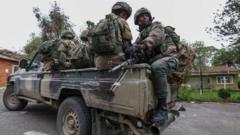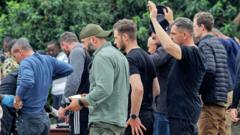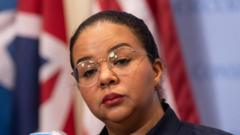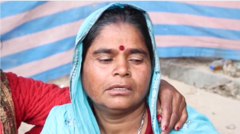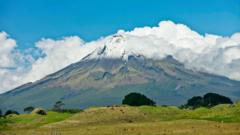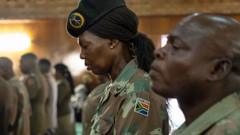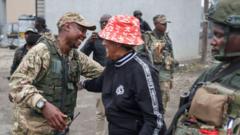Protests erupt in Kinshasa against Rwandan President Paul Kagame as the M23 rebels reportedly gain control of Goma, with UN findings suggesting Rwandan military involvement in training and supporting the insurgents.
Rwanda's Alleged Support for M23 Rebels Escalates Congolese Conflict
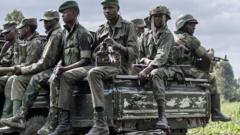
Rwanda's Alleged Support for M23 Rebels Escalates Congolese Conflict
Tensions rise in the Democratic Republic of Congo as evidence mounts of Rwanda's backing for M23 rebels amid protests in Kinshasa.
Protests in Kinshasa have intensified as residents accuse Rwandan President Paul Kagame of aiding M23 rebels during their aggressive advance, securing control over Goma, a key city in eastern Democratic Republic of Congo (DRC). Demonstrators vent their anger by setting fire to portraits of Kagame and destroying Rwandan flags, highlighting the region’s volatile atmosphere.
The United Nations has long reported suspicions regarding Rwanda's involvement, recently affirming that Rwandan forces operate "de facto" under M23’s command, participating in training and providing advanced weaponry. Located near Lake Kivu and bordering Rwanda, Goma serves as the capital for the mineral-rich North Kivu province, making its stability vital for trade and humanitarian efforts.
With approximately 2 million displaced individuals residing in the city, the resurgence of conflict following a violent episode on Sunday night has raised alarm. Factors such as disrupted communication infrastructures have complicated an already unclear situation, as explosions resonated throughout the streets amidst rising casualties.
"In Goma, there is no doubt about the presence of Rwandan troops assisting the M23," stated UN peacekeeping chief Jean-Pierre Lacroix. Although Kagame has consistently denied allegations of interference, there is growing consensus among experts that substantial evidence of Rwanda's support continues to emerge.
Richard Moncrief from the International Crisis Group noted, "The shift towards justifying a defensive stance has rendered it increasingly challenging to dismiss Rwanda's role in aiding M23." While Rwanda asserts its security is at stake due to ongoing battles near its border, historical contexts around the Rwandan genocide play a key role in Kagame’s perspective, reinforcing his stance against any Hutu-affiliated threats.
The M23 positions itself as a defender of the Tutsi community in DRC, yet with a backdrop of recurring tensions, regional experts argue that control over Goma may symbolize Kagame's attempt to assert influence in North Kivu. Following recent events, accusations of collaboration between Congolese military leaders and Hutu rebels have only deepened suspicions regarding Rwanda's motives.
The conflict has grown from its initial standoff more than a decade ago, and with reports of a sophisticated training infrastructure, the M23 continues to extend its sweep into vital mineral territories. The UN cited that the group has accumulated a revenue stream exceeding $800,000 monthly through coltan taxation in captured regions.
What compounds the crisis further is evidence suggesting Rwandan forces employ advanced technology to manipulate GPS signals, undermining Congolese military efforts to utilize drones. This tactical edge, according to Moncrief, drastically enhances M23's operational capability.
The escalating violence has led to the displacement of 400,000 individuals in just weeks, prompting urgent calls for international mediation. Amidst these heated confrontations, Kagame's responses remain dismissive of UN reports, framing accusations of involvement as exaggerated narratives.
As various stakeholders seek intervention, analysts predict that Rwanda will consistently prioritize the discussion of Hutu forces over any broader solutions to the ongoing conflict. The complexities surrounding these interlinked histories and current alliances are critical as the M23 crisis evolves, raising questions regarding regional stability and security in the heart of Africa.



